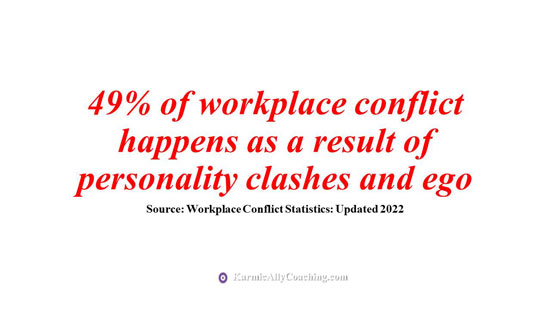This post has already been read 803 times!
Resource in video blog and additional reading
Conflict Resolution requires you know how to handle Strong Emotions
Emotional Intelligence: You need to apply authentic kind of Empathy
Free Having Tough Conversations Tips Report
Transcript: Handling Personality Conflicts in the Workplace

Personality conflicts are bound to happen even in the best of teams. But it doesn’t mean that it cannot be handled with grace and ease.
Now, just as we have five fingers on our hand and each finger is different, so too are co-workers in the modern workplace different.
We all have different skills, talents and even shortcomings. The multi-location co-workers would also have different cultural, educational and geographic backgrounds which can at times create a bit of tension.
We all have our own unique way of working and even then, a diverse and inclusive workplace can actually improve the bottom line and can be a blessing.
But it can also be a headache when there is a clash of personalities or working style.

For example, say you’ve got a colleague who loves to interrupt whenever you are speaking at a meeting. And in the beginning, you may think that okay you know, the person may have accidentally done it and hasn’t realized that you haven’t yet completed making your point.
But if it happens more than a few times you might start getting irritated and you may just realize that, you know, you’re having an issue with this person. You know what is the worst part? Sometimes the other person who’s interrupting you doesn’t even realize that they’re creating a problem!
Now, has this ever happened to you?
Think back about it and I’m sure that you would find that there are people who sometimes do end up irritating you even if they don’t mean to in the workplace.
In fact, according to the Workplace Conflict Statistics 49% of workplace conflict happens as a result of personality clashes and egos. And that is an issue that really does need to be resolved.

Defining Personality
But first before we go into the How part of it let us look at a definition of personality. I’ve actually got 2 for you.
The first one is straight out of the Enclyopedia of Britannica where, they’re looking at it as a psychological concept and two main meanings have evolved in there.
The first is that consistent differences that exist between people, which in a sense, is a study of the personality and is focusing on classifying and explaining relatively stable human psychological characteristics.
And the second meaning is that these qualities that make all people alike and that distinguish psychological man from other species. In other words, it directs the personality theorist to search for those regularities among all people that define the nature of man as well as the factors that influence the course of lives.
Now these are really quite complex definitions, especially if you’re not a psychologist. So let us go with one which is easier, and which is more relevant to us.
And that is one from Kendra Cherry and Steven Gans, MD, where they said that “personality is made up of the characteristic patterns of thoughts, feelings, and behaviours that make a person unique. In addition to this, personality arises from within the individual and remains fairly consistent throughout life.”
The point to note is, that they’re talking about it is a consistent behaviour.
General Principles while handling Personality Clashes at Work
So, if you’re going to try to deal with personality conflicts in the workplace and get them resolved, here are some general principles to consider.
Instead of trying to change others, try and understand the other person and build on our relationships with them. And here’s the thing.
You need to demonstrate Emotional Intelligence which helps you to also further show you’ve got Executive Presence. And here we’re talking about Social Awareness and Relationship Management. They ensure that your efforts get noticed and position you for potential leadership roles.
Another thing I’d like to say is that instead of thinking of it as a personality clash; why not think of it as a relationship problem and then try to solve it because there’s always a solution to every problem.
Going further into our General Principles, I suggest the following steps.
Firstly, examine your own part in a situation. Acknowledge your contribution to the situation. Are you doing something which might be agitating the other person to behave in a particular manner?
Develop compassion which means trying to see it from the other person’s point of view also. Another emotional intelligence step is to use perceptions (perceptual positions) an NLP technique.
Also think positive and focus on their strong points and workplace contribution. You know, when you can think something positive it can sometimes make the negative part a little easier to handle.
Practice active listening and listen closely to what the other person is saying. Maybe they know something you need to know too. Ask them to discuss your differences and work on solutions together. It can be difficult sometimes to have challenging conversations, but it is worth it.
And reach out. In other words, talk to them. Sometimes you know, sending emails or talking on the phone is not enough. Try, if it is possible to meet them face-to-face. It helps to resolve issues easier.
Set boundaries. In other words, if there is some behaviour which is not acceptable, let them know that it is not acceptable. Don’t allow them to build on it.
You can also ask for help or mediation. If you cannot do it yourself, ask your boss or even ask Human Resources to step in.
Recognize other issues. And more importantly as a potential leader or as a leader recognize that there may be other issues and take a different approach. It may not actually even be a personality! You know when you have people from different disciplines working in a team sometimes, they know things that you may not know, or they may raise issues that need to be resolved first if you want a successful project completion.
Specific examples for handling Personality Clashes
Now let’s take a look at some specific examples.
The first one is to be humble
Now how do you deal with a coworker who thinks they know it all? You need to keep in mind that they may be trying to compensate for their own insecurity. So, avoid being drawn into an argument and be firm if you want to discourage unsolicited input.
I’ve seen this happen many times even with my clients as well as during my own working life that there would always be an annoying know it all who wanted to be seen, wanted to be visible and used to be a nuisance. Handling them helped get issues resolved.
Stay on schedule
Now a colleague who misses deadlines and arrives late can hold up the whole team. So let them know how their actions affect others and set interim deadlines to help keep your projects on track.
Avoid griping
What happens when a little venting turns into chronic complaining? You may be able to help a coworker who tends to see themselves as a victim. But be careful.
Try to validate their feelings while also encouraging them to take responsibility for their actions and focus on solutions. This is what usually happens when people are not able to resolve something. And instead of trying to solve the thing or have an out of box solution and trying to implement it, they try to go into victim mode and put the blame on others.
Reduce the drama!
The other one is reducing the drama. Now maybe you find emotional swings and intense emotional displays a bit unsettling. We all have a Drama King or Queen in the office, and we need to know how to handle them.
But if your office is starting to feel like an opera company, then please take a deep breath and maintain a calm demeanor. Be part of the solution, not part of the catalyst to create even more aggravation.
Lighten up
And then lighten up. Now this is what I always tell people who are being micromanaged. It is, it does feel a little weird. It’s normal to feel undermined but it usually says more about your supervisor than it does about you.
And one tip that I have found that usually helps with these micromanagers is to actually give them detailed updates earlier on in order to ease any concerns that they may have.
Now coming back to something that I had mentioned earlier about having conversations and reaching out,
I have an extra resource which is free and that is Having Tough Conversations Tips Report. I invite you to download it. It’s for free and it will help you, give you some kind of guidance if you do find yourself having to have difficult conversations with emotional colleagues who are just unable to listen to you and at least try to get yourself heard.
Final Words of Advice
So my final words of advice are that conflicts are natural when you’re spending 40 plus hours or more a week with someone you might not choose for a friend outside of the workplace.
Knowing how to handle personality conflicts at work will help you to increase cooperation and reduce misunderstandings.
Think of it more as a relationship issue rather than as a personality conflict and reframe it from that vantage point. You might find better solutions.
And lastly download the Having Tough Conversations Tips Report to support your efforts in Relation Management.
So that’s all from me. I’m Vatsala Shukla from Karmic Ally Coaching signing off. Let’s go and make stronger relationships and avoid personality clashes in the workplace. Bye for now.






 I adhere to the Certified Coaches Alliance Code of Ethics and Standards. A copy is available on request.
I adhere to the Certified Coaches Alliance Code of Ethics and Standards. A copy is available on request.
 Let's Talk through the Connect Form:
Let's Talk through the Connect Form: